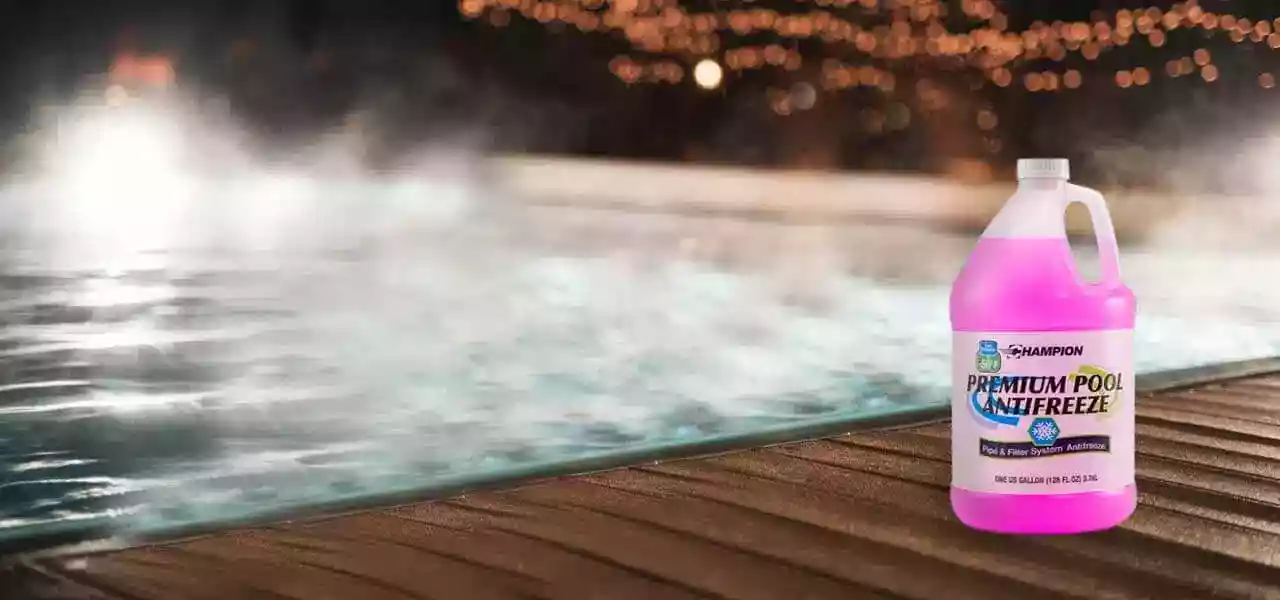FREE Standard Shipping On All Orders $100 or More!*

Swimming Pool Antifreeze FAQ

Before we begin, it's important to note that vehicle antifreeze is NOT the same as swimming pool antifreeze. The antifreeze you use in your car is toxic, while pool antifreeze is non-toxic and perfectly safe to swim in the water.
Now that we've cleared that up, let's discuss what pool antifreeze is and why you should use it in your pool!
Q: Is Swimming Pool Antifreeze Necessary?
A: No, using pool antifreeze is not necessary! That is, as long as you blow out all the water from your pool pipes. As the name implies, pool antifreeze is used to prevent water from freezing in the plumbing pipes. Therefore, properly blowing out the water in the pipes will eliminate the water, as well as the need for antifreeze.
However, many people use antifreeze as additional insurance against faulty plugs, or if you're not certain all the water has been blown out. Pool antifreeze won't damage your pool, so even if you're sure you blew out all the water, it's not a bad idea to still use a bit.
Q: How Much Swimming Pool Antifreeze Should I Use?
A: Most manufacturers recommend 1 gallon of pool antifreeze for every 10 feet of water-filled pipe. Use less antifreeze if you blew out all, or some, of the water in your pipes. Always refer to the dosing instructions on your container of pool antifreeze.
Q: How Do I Add Swimming Pool Antifreeze?
A: Lower your pool's water level to the winter closing level, and pour the antifreeze into the skimmer. To use it in the return line, cleaner line, or main drain line, use a section of garden hose with a funnel, and insert the hose from the pump or from a partially disassembled valve.
Q: Can I Pour it on Pool Equipment?
A: Don't pour pool antifreeze directly on pool equipment. The salts and glycol within the antifreeze react negatively to the metals and rubber of your pool equipment. Antifreeze also reacts dangerously with chlorine, so avoid putting any in your chlorinator.
Q: Can I Pour it Directly Into the Pool?
A: We know the name says "pool" antifreeze, but believe it or not, you should not use it in your pool. It would take gallons upon gallons of antifreeze to prevent your pool from freezing. Pool antifreeze is for the pipes, not for the pool.
For above ground pools, use an air pillow to break up ice sheets that form in the pool. Alternatively, partially fill a few milk jugs with pebbles and pool antifreeze for the same effect.
Q: Will Swimming Pool Antifreeze Protect a Main Drain Line?
A: Antifreeze can potentially protect a main drain line, but remember that antifreeze is heavier than water, and it will seek the lowest level in the pipe. If your main drain pipe has a steady pitch, as many do, you may notice the antifreeze coming out of the main drain, into the pool shortly after adding it.
Q: Will Swimming Pool Antifreeze Harm the Pool Water?
A: Nope! It's specifically non-toxic and doesn't pose a threat to swimmers or water chemistry.
Q: Can I Use Automotive Antifreeze?
A: NO! Ethylene Glycol is extremely toxic to people, and should never be used in your pool or pool pipes. If possible, always purchase pool antifreeze from designated pool supply stores, not from local grocery stores. That way, you won't have to worry about accidentally buying automotive antifreeze.
Make sure the bottle is labeled swimming pool antifreeze, which contains propylene glycol.
Q: Are There Multiple Types of Pool Antifreeze?
A: There are — propylene glycol and a calcium based one. Propylene glycol, which is usually hot pink, is the most common type of pool antifreeze. The calcium-based version is much less popular and hard to find in stores.
Q: Will Pool Antifreeze Harm Animals?
A: Non-toxic pool antifreeze is not harmful to animals unless they ingest it. If your pet consumes any pool antifreeze, contact your veterinarian immediately. While they will likely have a mild reaction to it, it's better to be safe than sorry. Especially if you don't know how much your pet ingested.
Q: Should I Pour Pool Antifreeze in the Skimmer After Plugging the Hole?
A: Don't pour pool antifreeze in the skimmer after applying a skimmer plug. Doing so makes a scummy mess come spring, and it can attack rubber plugs, or the o-ring for threaded skimmer plugs. The better solution is to fill a quart or gallon bottle with pea gravel and/or antifreeze, and drop it in the skimmer after plugging the hole. Using a piece of heavy plastic under the skimmer lid can help keep rain water from dripping into the skimmer during winter.
There you have it, the most common questions for everything pool antifreeze related! We know we sound like a broken record, but this is extremely important: Pool antifreeze is NOT the same as automotive antifreeze. Pool antifreeze is non-toxic and will not harm swimmers, but automotive antifreeze is highly toxic and should never be used in your pool or pool equipment.